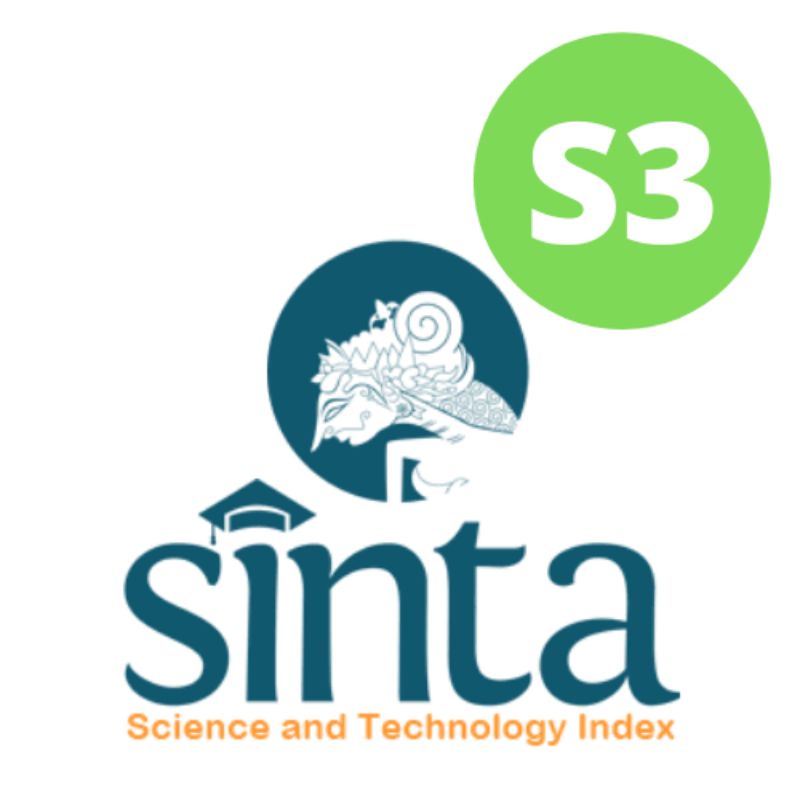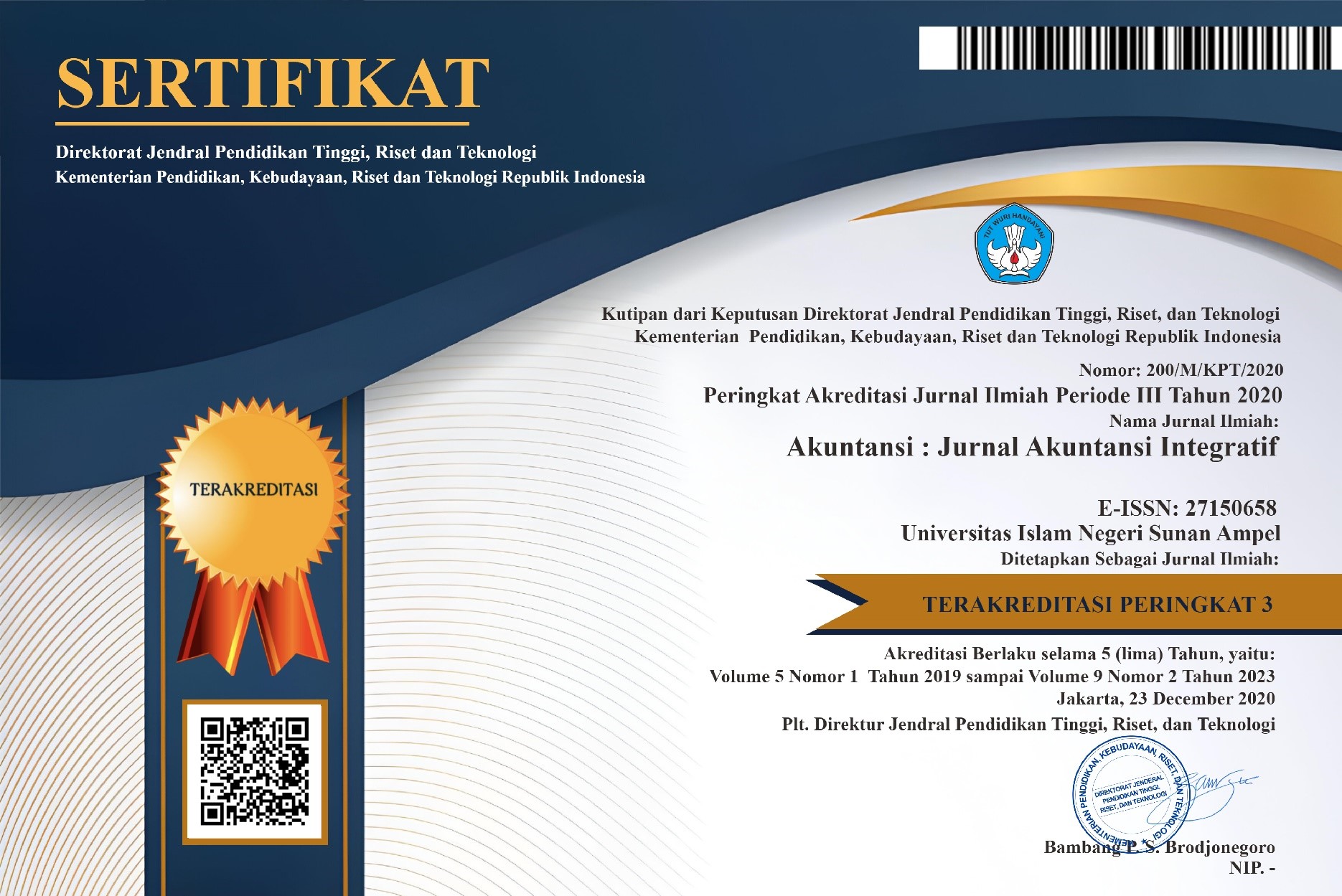Gender, Usia, Status Sosial, Pengalaman Kerja terhadap Persepsi Etis Mahasiswa dengan Love of Money sebagai Mediasi
DOI:
https://doi.org/10.29080/jai.v8i2.1071Keywords:
Gender , Age, Socioeconomic StatusAbstract
This research was conducted with the aim of analyzing the effect of gender, age, socioeconomic status and work experience variables on the love of money and ethical perceptions of accounting students. As well as to find out whether the love of money factor is the cause of ethical perceptions. Sampling in this study used a data collection method, namely purposive sampling. This study used a sample of undergraduate students at the Faculty of Economics and Business, Wijaya Kusuma University, Surabaya, Surabaya. The number of samples used is 100 respondents. Data analysis testing in this study used SPSS Version 20. The results of this study indicated that gender had a significant effect on students' ethical perceptions, while age, socioeconomic status and work experience had no significant effect on love of money. The variables of gender, age, socioeconomic status, and work experience have a significant influence on students' ethical perceptions. In addition, in the mediating effect of the variables gender, age, socioeconomic status, and work experience have a significant influence on students' ethical perceptions through the love of money.
Downloads
References
Alex Sobur. (2003). Psikologi Umum. Bandung: Pustaka Setia
Aziz, T. I. 2015. Pengaruh Love Of Money dan Machavellian Terhadap Persepsi Etis Mahasiswa Fakultas ekonomi dan bisnis. Jurnal Nominal Vol IV No.2
Betz, M. O. 1989. ‘Gender Differences in Proclivility for Unethical’, Vol. 8. Journal of Business Ethics, pp.321-324.
Charismawati, C.D. 2011. Analisis Hubungan Antara Love Of Money Dengan Persepsi Etika Mahasiswa Fakultas ekonomi dan bisnis. Skripsi Universitas Diponegoro.Elias, R.Z., 2006, “The impact of Professional Commitment and Anticipatiory Sosialization on
Accounting Students’ Ethical Orientation”, Journal of Business Ethics , 2007, “The Relationship Between Auditing Students’ Anticipatory Socialization and Their Professional Commitment”, Academy of Educational Leadership Journal
Erni, Riza. 2013. Pengaruh Pembelajaran Ekonomi dan Status Sosial Ekonomi terhadap Perilaku Konsumsi. Skripsi Tidak Dipublikasikan. Fakultas Pendidikan Ilmu Pengetahuan Sosial. Universitas Tanjungpura, Pontianak.
Fitria., Mella., dan Vita Fitria Sari. 2014. “Pengaruh Orientasi Idealisme, Relativisme, Tingkat Pengetahuan Akuntansi, Dan Gender Terhadap Persepsi Mahasiswa Akuntansi Tentang Krisis Etika Akuntan Profesional (Studi Empiris Mahasiswa Akuntansi Perguruan Tinggi di kota Padang)”. Jurnal WRA Universitas Negeri Padang. Vol. 2 No 1 April (2014).
Furnham, Adrian. 1994. Youth-Attitudes; Achievement-motivation-Cross Cultural-studies; Money- Psychological aspects. Journal Article.
Himmah, E. F. 2013. Persepsi Etis Mahasiswa Fakultas ekonomi dan bisnis Mengenai Skandal Etis Auditor dan Corporate Manajer. Jurnal Fakultas ekonomi dan bisnis Multiparadigma Vol 4 No. 1, 26-39.
Holmes, K., Marriott, L. and Randal, J., 2012, “Ethics and experiments in accounting A contribution to the debate on measuring ethical behaviour School of Accounting and Commercial Law”, Victoria University of Wellington, Wellington, New Zealand, and Pacific. Accounting Review, Vol. 24 No. pp. 80- 100.
Jogiyanto, dan Abdilah, W., 2014, Konsep dan Aplikasi PLS untuk Penelitian Empiris, Edisi 1, Cetakan 2, BPFE-Yogyakarta, Yogyakarta.
Johnson.E.N., Fleischman. G.M., Valentine S., &Walker.K.B. (2012). Managers Ethical Evaluations of earnings management and its consequences. Contemporary Accounting Research 29 (3 )
Jones, T.M. 1991. “Ethical decision making byi ndividuals in organizations: an issue- contingent model‟. Academy of Management Review, 16:2,366–395.
Kovach, K. A. 1987, “What Motivates Employees? Workers and Supervisors Give Different Answers,” Business Horizons, 30(5),58-66.
Luna-Arocas, R. And Tang, T.L.P (2004), “The love of money, satisfaction, and the protestant work ethic: Money profiles among university professors in the USA and Spain”, Journal Business Ethics, Vol. 50, pp. 329-54.
Milkovich, G.T. and Newman, J.M. (2002), Compesation, 7th ed., Irwin/McGraw-Hill, Boston, MA
Milyawati, A. U,. dan D. Darmawan. (2017). Pengaruh Idealisme, Relativisme, Love of Money, Gender dan Tingkat Pengetahuan Akuntansi terhadap Persepsi Mahasiswa Akuntansi atas Perilaku Etis Akuntan. Jurnal Universitas Maritim Raja Ali Haji.
Normadewi, Berliana. 2012. Analisis Pengaruh Gender dan Tingkat Pendidikan terhadap Persepsi Etis Mahasiswa Fakultas ekonomi dan bisnis dengan Love of Money sebagai Variabel Moderasi.Undergraduete Thesis. Universitas Diponegoro.
O’leary, C dan , D Cotter., 2000, “The Ethics of Final Year Accountancy Students: an International Comparison”, Managerial Auditing Journal.
Robbins SP, dan Judge, 2008. Perilaku Organisasi Buku 2, Jakarta : Salemba Empat Hal 256
Pradanti dan Prastiwi. 2014. Analisis Pengaruh Love Of Money Terhadap Persepsi Etis Mahasiswa Fakultas ekonomi dan bisnis. Diponegoro Journal Of Accounting Vol 3, 1-12.
Sipayung, E. R. 2015. Analisis Pengaruh Aspek Demografi, Status Sosial Ekonomi, dan Pengalaman Kerja Terhadap Persepsi Etis Mahasiswa Fakultas ekonomi dan bisnis Dengan Love Of Money Sebagai Variabel Moderasi. Skripsi Universitas Diponegoro Semarang.
Tang, T., Kim J., & Tang, D. 2000. “Does attitude towards money moderate the relationship between intrinsic job statisfaction and voluntary turnover?”. Human Relations, Vol 53 No.2, pp. 213-45.
Toriq, I. A. (2015). Pengaruh Love Of Money Dan Machiavellian Terhadap Persepsi Etis Mahasiswa Fakultas ekonomi dan bisnis (Studi Empiris Pada Mahasiswa Fakultas ekonomi dan bisnis UNY Angkatan 2013 dan Angkatan 2014).
Yeltsinta, R., Akuntansi, J., Ekonomika, F., Diponegoro, U., Prof, J., & Sh, S. (2013). Love of Money, Ethical Reasoning, Machiavellian, Questionable Actions : the Impact on
Accounting Students‟ Ethical Decision Making By Gender Moderation. Diponegoro Journal Of Accounting, 2(3), 1–11.
Downloads
Published
How to Cite
Issue
Section
License
Copyright (c) 2023 Eva Wany

This work is licensed under a Creative Commons Attribution-ShareAlike 4.0 International License.









